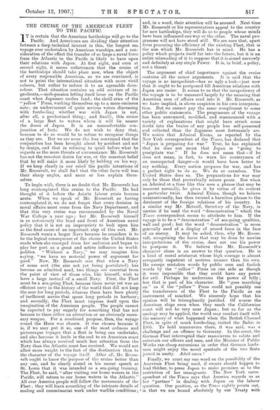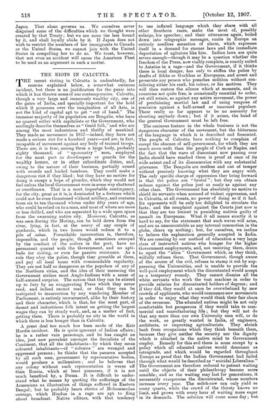THE CRUISE OF THE AMERICAN FLEET TO THE PACIFIC.
IT is certain that the American battleships will go to the Pacific. And Americans are dividing their attention between a deep technical interest in this, the longest sea voyage ever undertaken by American warships, and a con- sideration of the effect the transfer of so large a naval force from the Atlantic to the Pacific is likely to have upon their relations with Japan. At first sight, and even at second sight, it seems unfortunate that the cruise of the battleships should take place now, when the object of every reSpousible American, as we are convinced, is not to paint the international situation with more vivid colours, but rather to reduce it to an agreeable dove- colour. That situation contains an odd mixture of in- gredients,—mob-passion letting itself loose on the Pacific coast when Japanese coolies land; the shrill cries of the " yellow" Press, working themselves up to a more ominous note; an undercurrent of quite serious voices discussing with foreboding whether war with Japan is not, after all, a predestined thing ; and finally, this cruise of a large fleet to waters where it -will lie nearer the doors of Japan. It is an uncomfortable con- junction of facts. We do not wish to deny that, because to do so would be to refuse to recognise things as they are. But we are none the less convinced that the conjunction has been brought about by accident and not by design, and that in refusing to quail before what he regards as the mere threats of circumstance Mr. Roosevelt has not the remotest desire for war, or the remotest belief that be will make it more likely by holding on his way. If we keep clearly iu our mind the pacific intentions of Mr. Roosevelt, we shall find that the other facts will lose their sharp angles, and more or less explain them- selves.
To begin with, there is no doubt that Mr. Roosevelt has long contemplated this cruise to the Pacific. He had thought of it before the Asiatic labour crisis became acute. When we speak of Mr. Roosevelt as having contemplated it, we do not forget that. every decision in naval affairs must come from the Navy Department, and that this very cruise was recommended by the Naval War College a year ago ; but Mr. Roosevelt himself is so notoriously the head and front of American naval policy that it is not an impropriety to look upon him as the final cause of an important step of this sort. Mr. Roosevelt wants a larger Navy because he considers it to be the logical consequence of the choice the United States made when she emerged from her seclusion and began to play her part as a great and active influence in world- politics. " Without a Navy," we may imagine him saying, " we have no material power of argument for good." Now, Mr. Roosevelt sees that when a Navy of some sort (the size not yet being postulated) has become an admitted need, two things are essential from the point of view of those who, like himself, wish to have a large instead of a small Navy. First, the Fleet must be a sea-going Fleet, because there never yet was an efficient navy in the history of the world that did not keep the seas for long periods, whereas there have been plenty of inefficient navies that spent long periods in harbour; and secondly, the Fleet must impress itself upon the imagination of the American people. The people cannot be expected' to pay eagerly for something that has not become to them either an attraction or an obviously neces- sary weapon. For a combined purpose, then, the voyage round the Horn was chosen. It was chosen because it is, if we inay put it so, one of the most arduous and picturesque voyages that a fleet in being can undertake, and also because it leads in the end to an American coast which has always received 'much less attention from the Navy than the Atlantic coast has received. We would not allow more weight to the fact of the destination than to the character of the voyage itself. After all, Mr. Roose- velt ought to know the purpose of the cruise better than any one, and he clearly stated in his recent speech at St. Louis that it was intended as a sea-going training. The Fleet, he said, " after visiting our home waters in the Pacific, will return to our home waters in the Atlantic." All over America people will follow the movements of the Fleet ; they will learn something of the intricate details of coaling and commissariat work under warlike conditions;
and, in a word, their attention will be aroused. Next time Mr. Roosevelt or his representatives appeal to the country for new battleships, they will do so to people whose minds have been influenced one way or the other. The naval pro- gramme will not have stood still. We are sure that, apart from procuring the efficiency of the existing Fleet, that is the aim which Mr. Roosevelt has in mind. He has a policy which projects itself far into the future, but it is an entire misreading of it to suppose that it is aimed narrowly and definitely at any single Power. It is, in brief, a policy, not a threat.
The argument of chief importance against the cruise contains all the minor arguments. It is said that the voyage is so inexpedient—has so ugly a look—just now that it ought to be postponed till American relations with Japan are easier. It seems to us that the inexpediency of the voyage is to be measured largely by the meaning that American men of affairs read into it. Mr. Roosevelt, as we have implied, is above suspicion in his own interpreta- tion. But we cannot pay the same compliment to some other public statements. The programme of the voyage has been announced, modified, and reannounced with a' variety of explanations that might have struck some doubt into the brains of any people less self-possessed and collected than the Japanese most fortunately are. We notice that Admiral Evans, as reported by the New York correspondent of the Times, has declared that " Japan is preparing for war." True, he has explained that he does not mean that Japan is "going to precipitate war." If he does not mean that—if he does not mean, in fact, to warn his countrymen of an unsuspected danger—it would have been better to say nothing. Every nation prepares for war, and has a perfect right to do so. We do so ourselves. The United States does so. The preparations for war may only be those that proverbially secure peace. But when an Admiral at a time like this uses a phrase that may be innocent normally, he gives it by virtue of its context a particular twist. Admiral Evans, though we believe unintentionally, has thus twisted a harmless phrase to the detriment of the foreign relations of his country. In a similar way Mr. Metcalf, Secretary of the Navy, is unwise if he used the word " demonstration " which the Times correspondent seems to attribute to him. If the voyage is to be a " demonstration " of sea-going qualities,' well and good; but the word " demonstration " is more generally used of a display of armed force in the face of an enemy. It may be asked, then, why Mr. Roose- velt, recognising the harm that may be done by unwise interpretations of the cruise, does not use his power to postpone it. We believe that Mr. Roosevelt's character alone is an answer to that question. He is a kiud of moral aristocrat whose high courage is almost arrogantly impatient of motives meaner than his own. He sweeps mistaken words by public mon and foolish words by the " yellow " Press on one side as though it were impossible that they could have any power for evil. Perhaps he underrates the power of folly ; but that is part of his character. He " goes marching on " as if the "yellow " Press could not possibly use the transference of the Fleet to the Pacific as an instrument of mischief. We sincerely hope that his opinion will be triumphantly justified. Of course the American ships even when they reach the Californian coast will not be very near Japan ; but so far as the analogy may be applied, the world may comfort itself with the memory of what happened when the British Channel Fleet, in spite of much foreboding, visited the Baltic in 1905. To hold manoeuvres there, it was said, was a challenge and an offence to Germany. In the event, the German Fleet interrupted their manoeuvres to salute and entertain our officers and men, and the Minister of Public Works ran cheap excursions in' order that German lands- men might enjoy the novel spectacle of the two fleets joined in amity. Adsit omen. !
Finally, we must say one word on the possibility of the American Fleet being used, if events should happen to lead thither, to press Japan to make promises as to the restriction of her immigrants. The New York corre- spondent of the Times says that America regards us as her "partner" in dealing with Japan on the labour question. Our position, as the Times rightly points out, is that we are bound absolutely by our Treaty with Japan. That alone governs us. We ourselves never disguised some of the difficulties which we thought were. created by that Treaty ; but we are none the less bound by it, and shall loyally abide by it. If Japan does not wish to restrict the numbers of her immigrants to Canada or the United States, we cannot join with the United States in compelling her to do so. We trust, however, that not even an accident will cause the American Fleet to be used as an argument in such a matter.











































 Previous page
Previous page